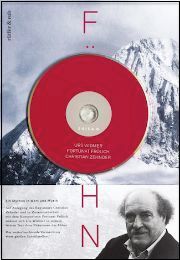Föhn - a musical weather game
On Urs Widmer's weather-illuminating legacy in the setting by Fortunat Frölich based on an idea by Christian Zehnder.

A popular saying refers to the Föhn as the oldest inhabitant of Central Switzerland. Anyone who has experienced a Föhn storm there knows that this hot wind could also be described as a primal musician, because it sings, whistles, roars and thunders, making everything that is not nailed down rattle, clatter and rumble.
The initiator of the opera Hair dryerwhich premiered on the main stage of Theater Basel in 2014, the singer and director Christian Zehnder rightly wonders why this phenomenon has never been translated into music. There are certainly echoes of the music of the Alps as a couleur locale in Romantic stage works with Swiss content and in symphonic works with pastoral motifs, but the destructive power of the mountain spirits has only been recalled in more recent times by Heinz Holliger's Alb-Cheehr from 1991.
Anyone who has missed the few staged performances of the opera can now pick up a beautifully designed book and CD with nature and theater photos, published by rüffer & rub: Föhn, a myth in words and music.
The performers are the same as in the Basel production. However, they have re-recorded the work with the Ensemble Phönix Basel under the overall direction of Erik Oña, changing the sequence of recitations in standard language (speaker: Hansrudolf Twerenbold), the spoken dialog in a mixture of Uri and Obwalden dialect of the peasant couple (Carina Braunschmidt and Martin Hug), the male choir parts (prepared by Fritz Näf) and the vocal parts (the Danish coloratura soprano Susanne Elmark as the Föhnfrau and the yodel and overtone singer Christian Zehnder as the mountain and weather caller).
The task of the chamber orchestra is to use mainly wind and some string instruments, electric guitar, piano, percussion and noises to onomatopoeically depict wind, avalanches and the brute force of nature in roaring and boiling. The composer works with serial elements, uses clusters of up to twelve tones, but also composes freely in different sounds, even incorporating rows of carols and the head motif into folk songs in the choral parts Lueget vo Bärge and Tal.
In the spoken passages, the mountain people complain about the foehn. It is to blame for erotic excitement, pain and suffering. Helplessly, the farmer's wife resorts to a magic spell: "Rämpä, mämpa, dWelt isch scheen / Hä kä Ängscht, dü bleede Feehn." Nevertheless, the mountain thunders down into the valley. Only the foehn remains. The farmer and the farmer's wife hold hands.
The libretto testifies one last time to the poet's exuberant imagination, eloquence and love of his environment. Urs Widmer did not live to see the performance in which he was scheduled to be the narrator. Thus Föhn - a cyclical weather game in the printed, spoken and sung word has become a shining legacy.
Urs Widmer, Fortunat Frölich, Christian Zehnder, Föhn - Ein Mythos in Text und Musik, 144 p., with CD, Fr. 34.00, rüffer & rub, Zurich 2016, ISBN 978-3-907625-93-4








